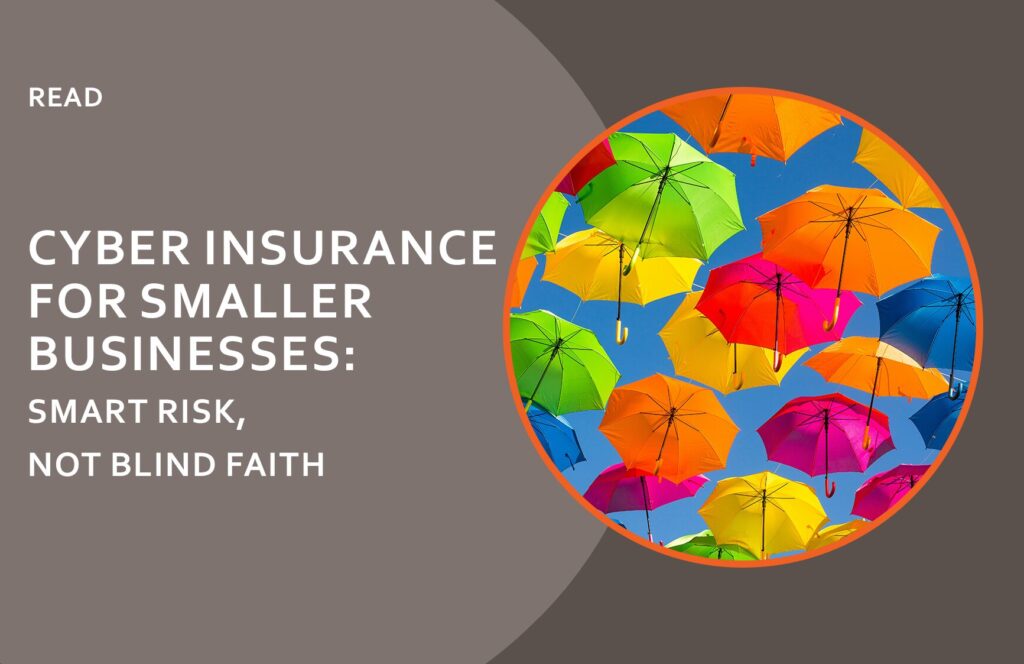READ: Cyber Insurance for Smaller Businesses: Smart Risk, Not Blind Faith

You buy fire insurance hoping the building never burns down. Cyber insurance is the same idea for your data, reputation, and continuity. For small businesses, it’s not a cure-all. But when used wisely, it’s a critical line of defense against the unexpected.
Let’s break down what cyber insurance really covers, when it makes sense, common pitfalls, and how to make it work for you.
What Is Cyber Insurance, Anyway?
Cyber insurance (sometimes called cyber liability insurance) covers costs associated with a cyber incident. That can include:
- Forensics, investigation, and incident response
- System restoration and data recovery
- Business interruption and lost revenue
- Notification and credit monitoring for affected customers
- Legal, regulatory, and settlement costs
- Sometimes ransom payments (but often with strict limits and conditions)
It’s important to know that cyber insurance is not a substitute for security. It assumes you already have baseline controls in place. Also, policies may exclude some attack types (state-sponsored, war exclusions, etc.).
When Does Cyber Insurance Make Sense for Smaller Businesses?
There’s no one-size-fits-all answer. But here are situations where a policy tends to be more valuable:
- You store or process customer data
If you hold data that others care about, such as emails, financial information, or health details, a breach could lead to costly obligations. - You can’t absorb a big disruption
If your business can’t survive weeks of downtime, the indemnification for lost income is valuable. - You work with regulated clients or industries
If you need to meet contract requirements or regulatory standards, insurance might be part of their expectations. - You’re scaling and exposure is increasing
As you grow, so does your risk. It’s easier to have coverage in place than scramble after an incident.
What are Some Common Pitfalls and Gotchas?
Cyber insurance is powerful, but only if you understand its limits and risks. Here’s where small businesses often get tripped up:
- Claims rejected for lack of foundational security
If your policy assumes you have the Cybersecurity Controls and Practices required, but you don’t, insurers may deny a claim. - Silent exclusion clauses
Some policies exclude things like state-sponsored attacks, AI-based attacks, or supply-chain incidents. Always read the fine print. - Coverage limits too low
You might estimate your exposure at $100,000 only to find that costs balloon to $500,000 after legal, PR, and business loss. - Premiums based on risk posture
Insurers reward good security hygiene. If your security is weak, premiums may go up, or you may get outright declined. - Overlapping or redundant coverage
Some “cyber” coverage is nested in general liability or property policies. That creates confusion about what you actually have.
How Can Small Businesses Use It Strategically?
- Start with a readiness assessment
Understand your gaps; insurance is not a shortcut. Insurers expect you to manage core risk. - Shop based on risk, not price alone
Don’t just pick the cheapest policy. Compare coverages, exclusions, and how well it aligns with your risk profile. - Align coverage to your mission and exposure
If business interruption is your biggest vulnerability, ensure that’s included. If reputational damage matters, include PR response. - Use the insurance as leverage for security
Treat your insurer’s requirements as a roadmap for improvement. Meeting them helps your security overall. - Retain or review your policy annually
Threats evolve. Coverage needs to evolve with you.
The OrbitalFire Perspective
It’s never about what you ‘have to’ have. It’s about understanding what makes sense for your business mission. Before you jump, always consider:
- What is your risk tolerance?
- What kind of exposures could knock you off course?
- Which coverage options align best with your business strategy?
We help you use cyber insurance as a tool, not as a guarantee, to complement sound risk management and security practices.
Cyber insurance is one of the few financial tools that can help you get back up after a cyber event. But it’s not magic. It’s only as good as your controls, your understanding of coverage, and how you use it.
When drafted well, cyber insurance can shift worst-case scenarios from business-killers to manageable recoveries. As a small business, treat it as part of your defense—not as your only defense.
OrbitalFire helps smaller organizations understand if, and what, cyber insurance works for their business, and helps businesses successfully complete cyber insurance requirements. We have experts that can review your policy, and we have great insurance partners if you want to shop around. Learn More







